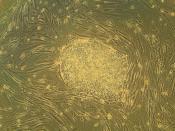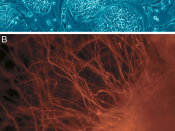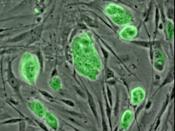Stem cells are the primary cells that can be trained to develop into any human cell tissue eg (muscle, skin, brain, etc.) However, in embryonic stem cell research, to retrieve stem cells from embryos requires a process called therapeutic cloning where a person's DNA is put into an unfertilised human egg (effectively cloning a person), the embryo is then grown for a few days before it is destroyed, producing stem cells identical to the donor person, without any likelihood of rejection once injected.
Embryonic stem cell research offer the hope of curing diseases such as,
Blood Disorders
Diabetes
Parkinson's disease
Alzheimer's disease
Motor neurone disease
Spinal cord injuries
It could even create retina cells, which could cure blindness or skin cells for burns victims.
One of the debates on embryos is whether it is a human being or just a bunch of cells. One of the views is, life does not start until the foetus has left the mother with its first unassisted breath.
It is said that life doesn't start at conception because embryos cannot be frozen. For life to be possible, humans obviously need blood, and there is no blood present in embryos at all. It takes 9 months to grow a body that will sustain life.
Embryos lack the capacities that earn us respect such as, a brain, consciousness and preferences. Embryos have no emotion and cannot feel physical pain. They are not fully developed beings, therefore, They have not yet achieved enough to matter, and do not have full rights or dignity, so their right to life cannot outweigh a grown human being's. There are strong arguments supporting this belief that an individual's status rises as it begins to realise its potential to develop morally valuable characteristics. However it could be said that although they...



Bad
the text is fully plagiarized and copy pasted from other sites.
0 out of 0 people found this comment useful.